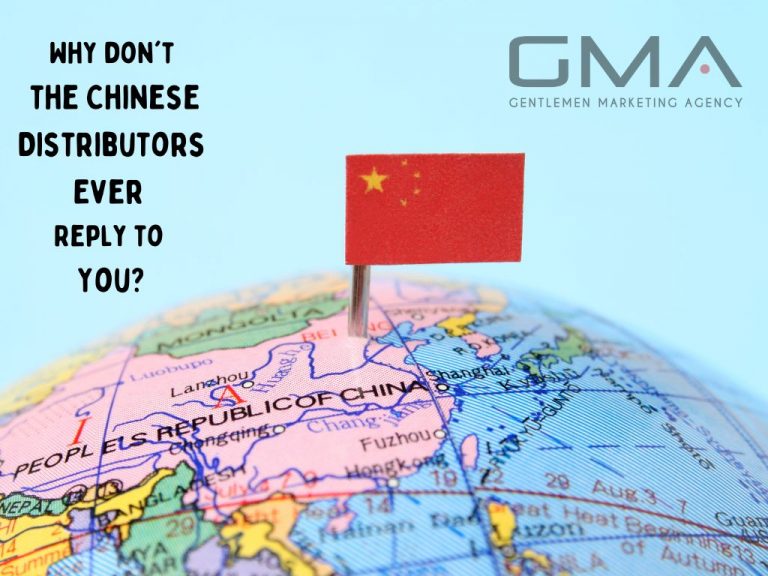Aldi in China : How to Enter to the Discount Supermarkets Chains
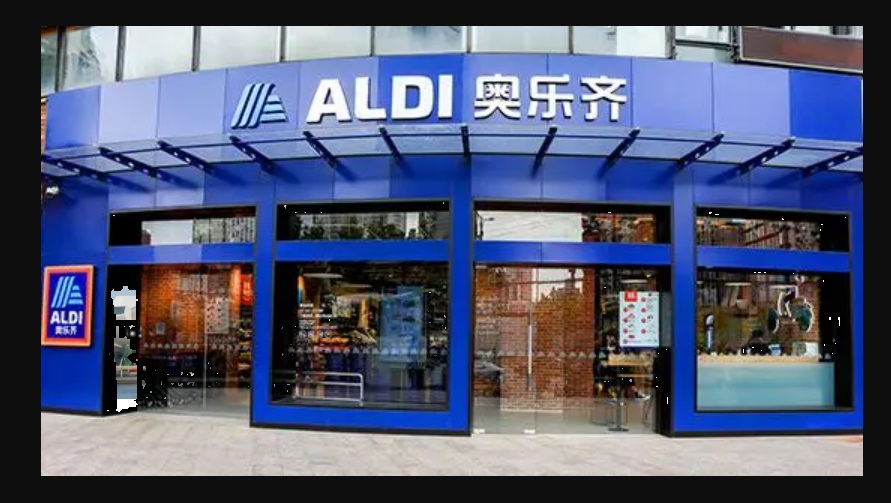
ALDI in China: A Strategic Expansion in the Retail Landscape with low cost and global products.
Cost-Effective Agency
KPI and Results focused. We are the most visible Marketing Agency for China. Not because of huge spending but because of our SMART Strategies. Let us help you with: E-Commerce, Search Engine Optimization, Advertising, Weibo, WeChat, WeChat Store & PR.
ALDI, the renowned global discount supermarket chain, has been carving out a significant niche in China’s dynamic retail market. With a focus on offering quality products at competitive prices, ALDI’s foray into China represents a strategic move that aligns with the evolving preferences of Chinese consumers.
Five Key Figures of ALDI’s Presence in China:
- Entry into China: ALDI made its debut in the Chinese market in 2017, initially positioning itself as a community supermarket for the middle class.
- Store Count: As of [current year], ALDI has been expanding its physical presence in China, with a focus on major urban centers.
- Product Range: ALDI’s product lineup in China includes a mix of international and local brands, catering to a diverse consumer base.
- Price Strategy: ALDI upholds its global reputation for affordability, offering competitively priced products that challenge existing pricing norms in the Chinese retail sector.
- Consumer Demographics: Targeting a broad demographic spectrum, ALDI appeals to cost-conscious shoppers who do not want to compromise on quality.
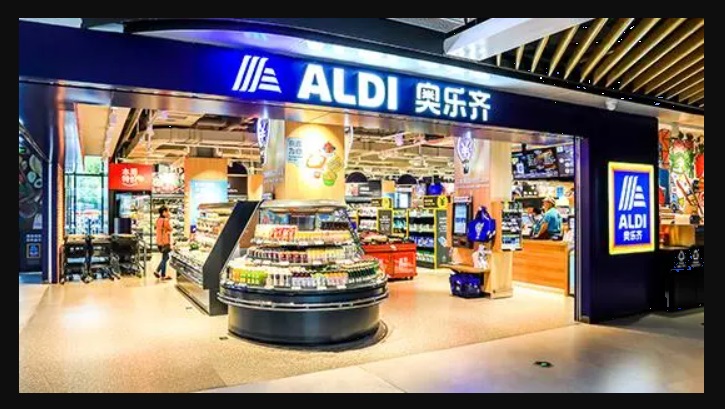
Aldi, the low cost strategy in China
On December 20th, Shanghai’s Jing’an Temple metro station transformed into an unusual visual spectacle, courtesy of ALDI. Commuters were greeted with four massive grocery installations: a Chinese leaf, a carrot, a milk carton, and a croissant, all towering over the station’s floor. These were not mere decorations but strategic advertisements by STDecaux promoting ALDI’s emphasis on low pricing.
Aldi Advertising in Metro
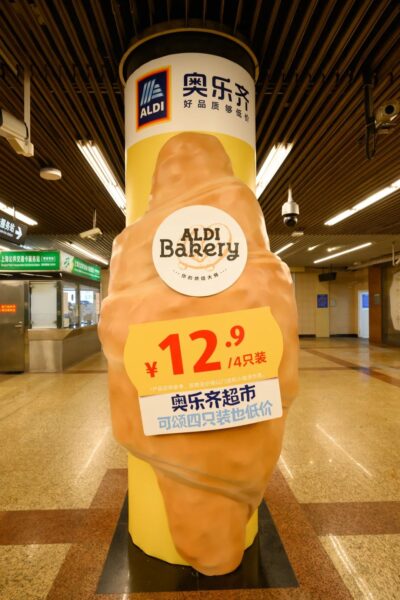
Each of these oversized grocery items displayed a price tag, showcasing ALDI’s competitive pricing in a visually arresting manner. The Chinese leaf was tagged at 3.5 RMB (0.49 USD) per 500g, carrots at 1.96 RMB (0.28 USD) per 800g, 950ml of milk for 8.9 RMB (1.25 USD), and four croissants for just 12.9 RMB (1.81 USD). These installations, accompanied by large billboards, have been drawing crowds, encouraging passersby to pause, admire, and even snap pictures.
Aldi to open hundreds of stores in China
While these prices are appealing in the context of Shanghai, they have sparked discussions among netizens about their affordability in broader scenarios.
ALDI, a well-known brand established in 1946 by the Albrecht brothers in Germany, initially entered the Chinese market in 2017. Initially, ALDI aimed to position itself as a community supermarket for the middle class, straying from its globally recognized image as an affordable discount store. However, over the past six years, China’s market dynamics have shifted. Embracing the trend of rational consumption, ALDI has realigned its strategy in China with the motto “good quality, better prices,” reminiscent of its “spend a little, live a lot” slogan
Read more
The clever and catchy taglines on these giant installations have caught the attention of Chinese netizens, effectively rebranding ALDI in the eyes of the young, urban population. Online comments have praised this fresh marketing approach, hinting at the involvement of the younger post-2000 generation in these creative campaigns.
Despite facing intense competition from warehouse clubs like Costco and Sam’s Club, as well as online supermarkets like Hema, ALDI’s return to its roots of offering low prices and discounts could mark a significant turn in its market positioning in China. With decades of experience in the discount retail sector, ALDI’s strategy in China is one to watch, as it could redefine its success in the evolving retail landscape.
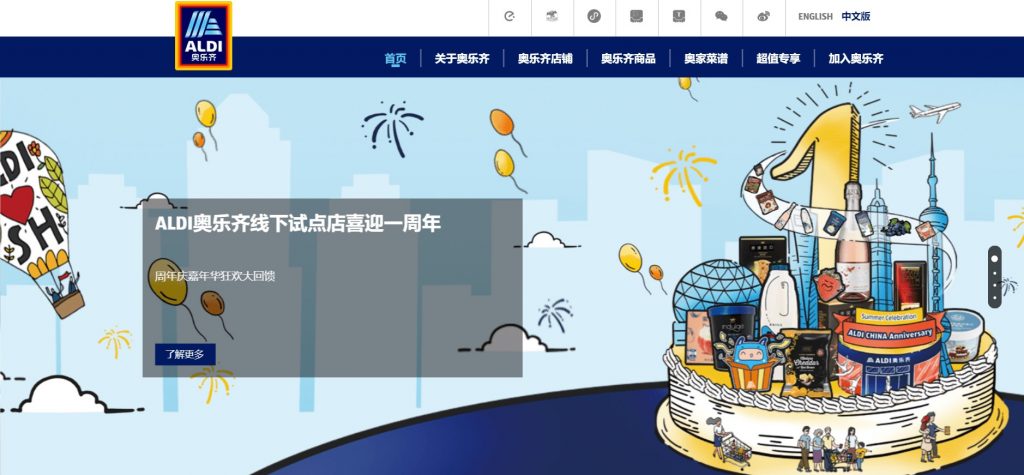
What Brands Does ALDI Want in China?
ALDI’s brand strategy in China is centered around two core principles: affordability and quality. The retailer is keen on curating a selection of products that resonate with the value-seeking yet quality-conscious Chinese consumer. This includes:
- Private Labels: In line with its global strategy, ALDI offers a range of private label products that provide high quality at lower prices.
- Local Brands: Understanding the importance of localized offerings, ALDI includes popular Chinese brands in its product mix.
- International Favorites: To cater to the cosmopolitan tastes of urban Chinese consumers, ALDI stocks internationally recognized brands, particularly in categories like snacks, beverages, and household goods.
ALDI’s Strategic Approach in China
ALDI’s approach in China is multifaceted, adapting to local market conditions while staying true to its global ethos. Key aspects of its strategy include:
- Digital Integration: Recognizing the importance of e-commerce in China, ALDI has established a strong online presence alongside its physical stores.
- Marketing Innovations: ALDI employs creative marketing strategies, such as visually appealing in-store displays and culturally relevant advertising campaigns, to engage the Chinese consumer.
- Supply Chain Efficiency: Leveraging its global expertise, ALDI optimizes its supply chain to maintain low costs and ensure product freshness and availability.
How to sell at Aldi
ALDI’s expansion in China is a testament to the retailer’s adaptability and understanding of the diverse retail environment. By balancing affordability with quality and integrating local preferences into its brand and product strategies, ALDI is well-positioned to become a key player in China’s competitive retail landscape. As the brand continues to grow and evolve in China, its journey will offer valuable insights into the dynamics of retail success in one of the world’s largest consumer markets.




